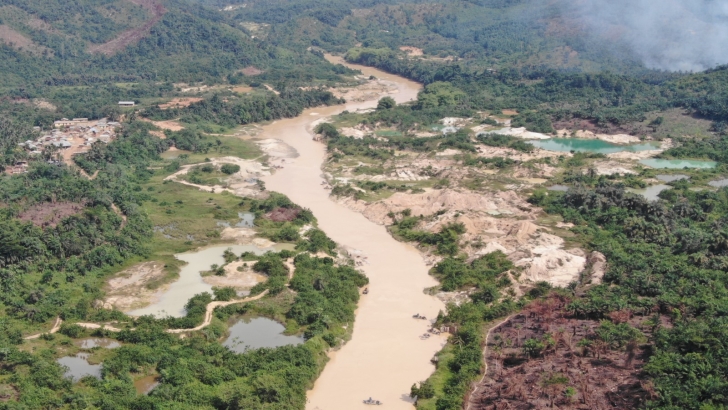
Galamsey, environmental catastrophe - Pathways to sustainable solutions
Ghana, a country renowned for its abundant natural resources, is grappling with a pressing environmental issue linked to galamsey (illegal small-scale mining).
While offering economic benefits to some, galamsey poses a grave threat to Ghana's ecosystems and overall environmental well-being. This article delves into the complex impacts of galamsey, presents suggested solutions and advocates for the implementation of strategic pathways that will pave the way for a sustainable future in Ghana.
Impact of galamsey
Galamsey is linked to catastrophic declines in Ghana’s ecosystems, including rampant deforestation, water pollution and loss of biodiversity. Rivers and streams, sources of drinking water for many rural communities, are now contaminated with toxic chemicals used in gold extraction.
This not only affects aquatic life but also poses health risks to communities relying on these water sources.
Major rivers, including the Pra, Ankobra, Oti, Offin and Birim, are all heavily polluted by galamsey activities, notably the use of mercury and cyanide in gold extraction. Communities that depend on these rivers for drinking water and agriculture face severe health risks, including mercury poisoning, which causes serious neurological and developmental damage.
The health and environmental costs of galamsey extend beyond ecological degradation. The economic benefits are overshadowed by long-term health issues, loss of arable land and the destruction of habitats.
Ghana’s crucial cocoa sector has not been spared the devastating effects of galamsey activities. Financial gains for miners are outweighed by extensive damage to society’s environment and public health.
For instance, the destruction of forest cover not only leads to loss of biodiversity but also contributes to climate change by reducing the carbon sequestration capacity of these forests.
Proposed solutions
To resolve damage to well-being, there is a need for effective community engagement, exploration of sustainable alternatives, as well as appropriate regulation and enforcement.
Strengthening laws and regulations to control illegal mining activities is crucial. Effective enforcement would deter illegal operations and ensure that mining practices adhere to environmental standards.
The government should increase funding for the Environmental Protection Agency to enhance monitoring and enforcement activities. Additionally, deploying technology such as drones and satellite imagery would help in identifying and closing illegal mining sites.
Additionally, promoting sustainable livelihoods such as eco-tourism, sustainable agriculture and renewable energy would provide viable alternatives to galamsey. These industries not only protect the environment but also offer long-term economic benefits.
For example, eco-tourism would leverage Ghana’s rich biodiversity and cultural heritage to attract tourists, create jobs and generate increased revenue. In addition, sustainable agriculture practices, such as agroforestry, would improve soil health and increase crop yields, providing a stable income for farmers.
Furthermore, involving local communities in conservation efforts and decision-making processes is essential. Empowering communities with knowledge and resources would foster a sense of ownership and responsibility towards environmental conservation.
For instance, community-based natural resource management programmes would involve local people in protecting and managing forests and water bodies. Providing education and training on sustainable practices would also help communities transition away from galamsey.
Strategies to foster a sustainable future
To address the catastrophe of galamsey in Ghana, it is crucial to implement comprehensive strategies that include green economy initiatives and collaborative efforts.
Investing in vocational training and entrepreneurship programmes would create green jobs, reducing the dependency on galamsey. For instance, training programmes in renewable energy technologies, such as solar panel installation and maintenance, could provide new employment opportunities.
These programmes could be supported by partnerships with civil society organisations (CSOs), international organisations and private sector companies. Furthermore, providing access to microfinance and green funding initiatives could support sustainable businesses, encouraging a shift away from illegal mining.
Microfinance institutions could offer low-interest loans to small businesses and entrepreneurs engaged in environmentally friendly activities. For example, farmers could access funds to invest in organic farming practices, which can improve soil health and increase productivity.
Finally, a cooperative effort involving miners, political parties, CSOs and the government is crucial in exploring strategies to foster a sustainable future for Ghana. A non-partisan approach would ensure that environmental policies are implemented effectively.
For instance, establishing multi-stakeholder platforms where all parties discuss and agree on sustainable mining practices would help build consensus and drive collective action.
In addition, learning from successful green economy models in other countries would provide valuable insights. For instance, Costa Rica’s reforestation efforts have successfully restored degraded lands and increased forest cover, providing a model for similar initiatives in Ghana.
In addition, Kenya’s renewable energy projects, such as the Lake Turkana Wind Power project, demonstrate how investment in renewable energy can drive economic growth and reduce environmental impact.
Conclusion
The perilous implications of galamsey necessitate urgent and concerted efforts to mitigate its adverse effects and steer Ghana towards a sustainable future. By emphasising effective community engagement, fostering sustainable alternatives and implementing stringent regulations and enforcement, Ghana could combat the scourge of galamsey.
Collaborative endeavours involving miners, political entities, CSOs and the government are imperative to formulating and implementing environmental policies effectively.
It is imperative to invest in green economy initiatives, vocational training, and entrepreneurship programmes to create viable alternatives to galamsey, thereby reducing dependency on illegal mining.
With concerted efforts and unwavering commitment, Ghana can overcome the challenges posed by galamsey and chart a course towards sustainable development and environmental preservation.
The writer is a Political Scientist.
